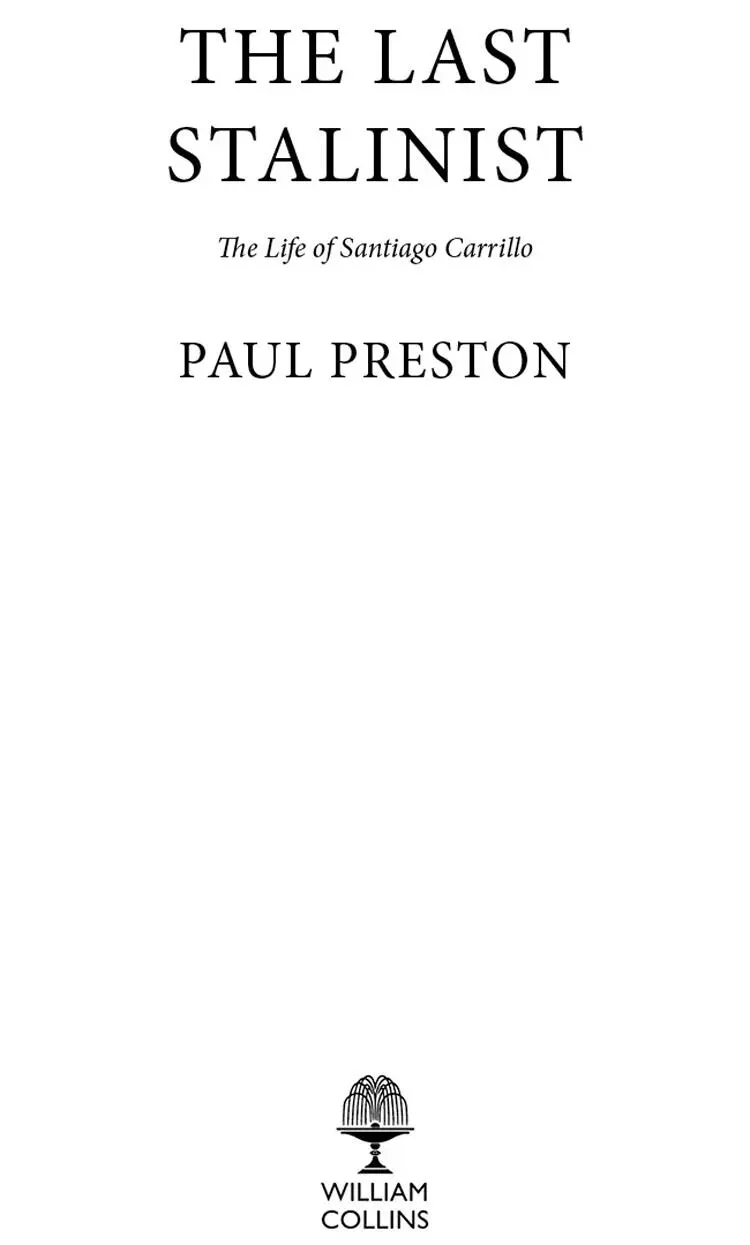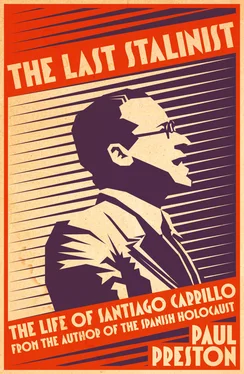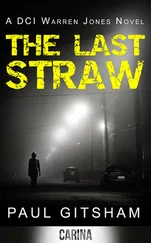
William Collins
An imprint of HarperCollins Publishers
77–85 Fulham Palace Road
London W6 8JB
www.WilliamCollinsBooks.com
First published in Great Britain by William Collins in 2014
Copyright © Paul Preston 2014
Paul Preston asserts his moral right to
be identified as the author of this work
A catalogue record for this book is
available from the British Library
All rights reserved under International and Pan-American Copyright Conventions. By payment of the required fees, you have been granted the non-exclusive, non-transferable right to access and read the text of this e-book on screen. No part of this text may be reproduced, transmitted, down-loaded, decompiled, reverse engineered, or stored in or introduced into any information storage and retrieval system, in any form or by any means, whether electronic or mechanical, now known or hereinafter invented, without the express written permission of HarperCollins.
Cover by Jonathan Pelham based on a photograph © EFE/Lafototeca.com
Source ISBN: 9780007558407
Ebook Edition © January 2015 ISBN: 9780007591824
Version: 2014-10-20
In memory of Michael Jacobs
Cover
Title Page
Copyright
Dedication
Acknowledgements
Preface
Author’s Note
1 The Creation of a Revolutionary: 1915–1934
2 The Destruction of the PSOE: 1934–1939
3 A Fully Formed Stalinist: 1939–1950
4 The Elimination of the Old Guard: 1950–1960
5 The Solitary Hero: 1960–1970
6 From Public Enemy No. 1 to National Treasure: 1970–2012
Epilogue
Abbreviations
Notes
Picture Section
Illustration Credits
A Note on Primary Sources
Bibliography
Index
By the Same Author
About the Author
About the Publisher
In a sense, the origins of this book date back to the 1970s when I first began to collect information about the anti-Francoist resistance. At the time and subsequently, I had long conversations with many of the protagonists of the book, including Santiago Carrillo himself. Many of those who shared their opinions and memories with me have since died. However, I would like to put on record my gratitude to them: Santiago Álvarez, Manuel Azcárate, Rafael Calvo Serer, Fernando Claudín, Tomasa Cuevas, Carlos Elvira, Irene Falcón, Ignacio Gallego, Jerónimo González Rubio, Carlos Gurméndez, Antonio Gutiérrez Díaz, K. S. Karol, Domingo Malagón, José Martinez Guerricabeitia, Miguel Núñez, Teresa Pàmies, Javier Pradera, Rossana Rossanda, Jorge Semprún, Enrique Tierno Galvan, Manuel Vázquez Montalbán, Francesc Vicens and Pepín Vidal Beneyto.
Over the years, I discussed the issues raised in the book with friends and colleagues who have worked on the subject, some of whom played a part in the events related therein. I am grateful for what I have learned from Beatriz Anson, Emilia Bolinches, Jordi Borja, Natalia Calamai, William Chislett, Iván Delicado, Roland Delicado, Carlos García-Alix, Dolores García Cantús, David Ginard i Féron, María Jesús González, Carmen Grimau, Fernando Hernández Sánchez, Enrique Líster López, Esther López Sobrado, Aurelio Martín Nájera, Rosa Montero, Silvia Ribelles de la Vega, Michael Richards, Ana Romero, Nicolás Sartorius, Irène Tenèze, Miguel Verdú and Ángel Viñas Martín.
Finally, this book would not have been possible without the friends who helped with documentation and who read all or part of the text: Javier Alfaya, Nicolás Belmonte Martínez, Laura Díaz Herrera, Helen Graham, Susana Grau, Fernando Hernández Sánchez, Michel Lefevbre, Teresa Miguel Martínez, Gregorio Morán, Linda Palfreeman, Sandra Souto Kustrin and Boris Volodarsky. I am immensely grateful to them all.
This is the complex story of a man of great importance. From 1939 to 1975, the Spanish Communist Party (the Partido Comunista de España, or PCE) was the most determined opponent of the Franco regime. As its effective leader for two decades, Santiago Carrillo was arguably the dictator’s most consistent left-wing enemy. Whether Franco was concerned about the left-wing opposition is another question. However, the lack of a comparable figure in either the anarchist or Socialist movements means that the title belongs indisputably to Carrillo.
Carrillo’s was a life of markedly different and apparently contradictory phases. In the first half of his political career, in Spain and in exile, from the mid-1930s to the mid-1970s, Santiago Carrillo was admired by many on the left as a revolutionary and a pillar of the anti-Franco struggle and hated by others as a Stalinist gravedigger of the revolution. For many on the right, he was a monster to be vilified as a mass murderer for his activities during the Civil War. He came to prominence as a hot-headed leader of the Socialist Youth whose incendiary rhetoric contributed in no small measure to the revolutionary events of October 1934. After sixteen months in prison, he abandoned, and betrayed, the Socialist Party by taking its youth movement into the Communist Party. This ‘dowry’ and his unquestioning loyalty to Moscow were rewarded during the Civil War by rapid promotion within the Communist ranks. Not yet twenty-two years old, he became public order chief in the besieged Spanish capital and acquired enduring notoriety for his alleged role in the episodes known collectively as Paracuellos, the elimination of right-wing prisoners. After the war, he was a faithful apparatchik, who by dint of skill and ruthless ambition rose to the leadership of the Communist Party.
Then, in the course of the second half of his political career, from the mid-1970s until his death in 2012, he came to be seen as a national treasure because of his contribution to the restoration of democracy. From his return to Spain in 1976 until 1981, his skills, honed in the internal power struggles of the PCE, were applied in the national political arena. During the early years of the transition, it appeared as if the interests of the PCE coincided with those of the population. He would be canonized as a crucial pillar of Spanish democracy as a result of his moderation then. He was particularly lauded for his bravery on the night of 23 February 1981 when the Spanish parliament was seized as part of a failed military coup. After that time, his role reverted to that of Party leader and he was undone by generational conflict. Between 1981 and 1985, he presided over the destruction of the Communist Party, which he had spent forty years shaping in his own image. Accordingly, in later life and on his death, he was the object of many tributes and accolades from members of the Spanish establishment ranging from the King to right-wing heavyweights.
The chequered nature of Carrillo’s political career poses the question of whether he was simply a cynical and clever chameleon. In 1974, denying the existence of a personality cult within the PCE, he proclaimed: ‘I will never permit propaganda being made about myself.’ 1Then, in an interview given two years later, he announced: ‘I will never write my memoirs because a politician cannot tell the truth.’ 2He had already contradicted the first of these denials by dint of speeches and internal Party reports in which he constructed the myth of a selfless fighter for democracy. Then, in his last four decades, he propagated numerous accounts of his life in countless interviews, in more than ten of the many books that he wrote himself and in two others that he dictated. 3In this regard, he shared with Franco a dedication to the constant rewriting and improving of his own life story.
Читать дальше













